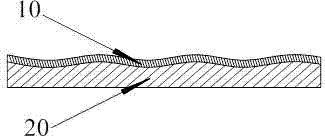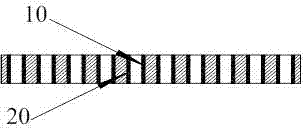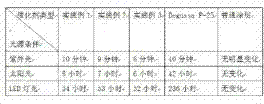Immobilized visible light response photocatalyst and preparation method thereof
A photocatalyst and visible light technology, applied in the direction of physical/chemical process catalysts, chemical instruments and methods, metal/metal oxide/metal hydroxide catalysts, etc. Restricting practical application and other issues, to achieve the effect of expanding the application field and scope, low cost of use, and firm adhesion
- Summary
- Abstract
- Description
- Claims
- Application Information
AI Technical Summary
Problems solved by technology
Method used
Image
Examples
Embodiment 1
[0042] Photocatalytic material: 30 grams
[0043] Cerium-zirconium material (calculated as cerium-zirconium solid solution): 20 grams
[0044] Mixed lanthanum and praseodymium: 10 grams
[0045] Polyaluminum: 25 grams
[0046] Silicon magnesium oxide (calculated as magnesium silicate): 15 grams
[0047] Water: 40 grams
[0048] Step A: Weigh the above-mentioned materials, mix them uniformly first, and then disperse them in a grinder for 12 hours, take out the ground material liquid and adjust its pH to 6.5 to obtain a colloidal slurry;
[0049] Step B: Select a ceramic or metal material with a suitable shape and size as a carrier, and clean up the oil, dirt, impurities, etc. on the surface;
[0050] Step C: According to the shape and structure of the carrier, apply the colloidal slurry on the carrier by dipping, spraying, brushing, etc., and remove the excess material liquid attached to the carrier to form a layer on the skeleton carrier Uniform and continuous coating lay...
Embodiment 2
[0053] Photocatalytic material: 55 grams
[0054] Cerium-zirconium material (calculated as cerium-zirconium solid solution): 15 grams
[0055] Mixed lanthanum and praseodymium: 5 grams
[0056] Polyaluminium: 15 grams
[0057] Silicon magnesium oxide (calculated as magnesium silicate): 10 grams
[0058] Water: 60 grams
[0059] Step A: Weigh the above-mentioned materials, first mix them uniformly, and then disperse them in a grinder for 20 hours, take out the ground material liquid and adjust its pH to 8.5 to obtain a colloidal slurry;
[0060]Step B: select a ceramic or metal material of suitable shape and size as a carrier, and clean up oil, dirt, impurities, etc. on its surface;
[0061] Step C: According to the shape and structure of the carrier, apply the colloidal slurry on the carrier by dipping, spraying, brushing, etc., and remove the excess material liquid attached to the carrier to form a layer on the skeleton carrier Uniform and continuous coating layer with a...
Embodiment 3
[0064] Photocatalytic material: 40g
[0065] Cerium-zirconium material (calculated as cerium-zirconium solid solution): 18 grams
[0066] Mixed lanthanum and praseodymium: 8 grams
[0067] Polyaluminium: 20 grams
[0068] Silicon magnesium oxide (calculated as magnesium silicate): 14 grams
[0069] Water: 50 grams
[0070] Step A: Weigh the above-mentioned materials, first mix them uniformly, and then disperse them in a grinder for 16 hours, take out the ground material liquid and adjust its pH to 7 to obtain a colloidal slurry;
[0071] Step B: select a ceramic or metal material of suitable shape and size as a carrier, and clean up oil, dirt, impurities, etc. on its surface;
[0072] Step C: According to the shape and structure of the carrier, apply the colloidal slurry on the carrier by dipping, spraying, brushing, etc., and remove the excess material liquid attached to the carrier to form a layer on the skeleton carrier Uniform and continuous coating layer with a liqui...
PUM
| Property | Measurement | Unit |
|---|---|---|
| thickness | aaaaa | aaaaa |
Abstract
Description
Claims
Application Information
 Login to View More
Login to View More - R&D
- Intellectual Property
- Life Sciences
- Materials
- Tech Scout
- Unparalleled Data Quality
- Higher Quality Content
- 60% Fewer Hallucinations
Browse by: Latest US Patents, China's latest patents, Technical Efficacy Thesaurus, Application Domain, Technology Topic, Popular Technical Reports.
© 2025 PatSnap. All rights reserved.Legal|Privacy policy|Modern Slavery Act Transparency Statement|Sitemap|About US| Contact US: help@patsnap.com



